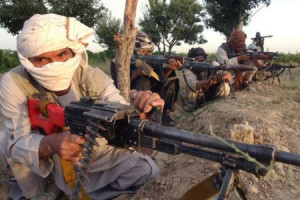
The killing of Hakimullah Mehsud — the former Pakistani Taliban leader, who was killed in an American drone strike Nov. 1 — occurred at a critical time in relations between the government and the insurgent group. Islamabad openly pursued a dialogue, and the Pakistani Taliban’s previous leadership had not rejected the idea. However, the new leader of the group has come out against any cooperation with Islamabad.
Prime Minister Nawaz Sharif’s ruling party, the Pakistan Muslim League N, held out hope for the success of sit-downs with the Pakistani militants. Sharif’s assurances that he would bring peace and stability to the country were a fundamental feature of his May election campaign. The breaking-off of the negotiations signals his first domestic and foreign policy setback as head of the Cabinet. Just days prior to the date appointed for the negotiations, Sharif returned from Washington having received assurances from President Barack Obama that U.S. drone strikes against insurgents would be halted while the negotiations were taking place.
The Pakistani Foreign Ministry has repeatedly emphasized its position that “the drone strikes violate the country’s sovereignty and territorial integrity.” In November, the strikes again provoked a wave of indignation in the country and a parliamentary crisis. Opposition parties in the upper house of the legislature, such as the Pakistan Peoples Party, the People’s National Party, the Beluchistan National Party and the Pakistan Muslim League Q, boycotted a Senate session, alleging that Nisar had provided false information about casualties from the drone strikes.
Imran Khan, head of the Movement for Justice, the leading political party in Khyber Pakhtunkhwa, proposed a blockade of the NATO-led coalition convoys to Afghanistan. But this idea garnered support from nobody except the militants.
The possibility of cooperation by the two opposing sides was first raised in 2012. The Pakistan People’s Party, which was in power at the time, followed the established practice and held several conferences aimed at reaching a unified consensus among legislators of various political parties. Sharif, who took office in June, supported the initiative.
The one government entity categorically opposed to round-table discussions with the rebels was the army, which is understandable. For one thing, in the first half of the 2000s the generals had entered into negotiations only to have the insurgents turn around and violate the agreements. And second, military installations are one of the Pakistani Taliban’s primary targets. The militants set preconditions for beginning negotiations. They insisted on the withdrawal of military units stationed in the Pashtun tribal areas of Pakistan and the release of captured insurgents.
Gen. Ashfaq Pervez Kiyani, the army chief of staff, was adamant that military operations against the militants should continue. Sharif had a change of heart following a visit by the commander of headquarters in Rawalpindi, and that served as a signal to Nisar to backpedal from his previous stance.
A major reason that talks continue to be postponed is that the Pakistani Taliban are still setting conditions for discussion of their agenda. Their demands include the release of jailed militants, the revocation of Pakistan’s constitution, the institution of sharia law in judicial proceedings and the affairs of daily life, and the withdrawal of military personnel from the Federally Administered Tribal Areas, the Pakistan-Afghanistan border and so on.
The American drone strikes and all the succeeding events give rise to at least two questions: What is it about the Pakistani Taliban that makes assassinating its leader a topic of discussion in the halls of parliament? And second, what in heaven’s name is going on in Pakistan-U.S. relations?
In the past decade, the Pakistani Taliban have emerged as an autonomous social force. With their challenges to the existing order, they can sway domestic policy and issue demands to the federal authorities. The group has become stronger over time. After beginning their struggle as insurgents using a campaign of armed violence against the army, the militants are now pushing a political agenda. In amassing a track record of terrorist aggression, they seek to render their behavior legal and do so strictly on their own terms alone. If their demands are not met, a new wave of terrorist attacks ensues.
A second point that deserves attention is the state of Pakistan-U.S. Relations. The new prime minister, Sharif, is trying with all his might to meet the political parties’ demands not to tolerate drone strikes. By acting this way, he is clearly counting on the $1.6 billion promised by Obama in October. Pakistan just received a new loan of $6.7 billion from the International Monetary Fund, but no additional funding from the Americans is coming Pakistan’s way.
Which priority will Sharif choose? Will he opt for political stability in return for Washington’s help? Will he be able to find a compromise, or will he present his own prescription for resolving the problem?
Natalia Zamaraeva , Ph.D., is a senior research fellow in the Pakistan bureau of the Institute of Oriental Studies and a special contributor to online magazine “New Eastern Outlook”.
